Property Law Assignment: Analysis of Property Rights and Case Studies
VerifiedAdded on 2021/06/16
|8
|1608
|247
Homework Assignment
AI Summary
This property law assignment explores fundamental concepts such as ownership, possession, and holdership, providing clear definitions and distinctions between them. It delves into the legal framework surrounding the transfer of property rights, emphasizing the principle of rei vindicatio and its application. The assignment examines key legislation like the Road Traffic Act and Regulations, as well as landmark cases such as Chetty v Naidoo, and the implications of the Prevention of Illegal Eviction from and Unlawful Occupation of Land Act (PIE Act). It analyzes the significance of the Port Elizabeth v Various Occupiers case, highlighting the importance of cultural heritage and Ubuntu in land law. Furthermore, the document discusses spoliation, its legal remedies, and the application of the mandament van spoile. The assignment also addresses the transfer of movables, focusing on the rights of sellers and buyers, and the concept of fixtures. The assignment is supported by relevant case law and legal references.
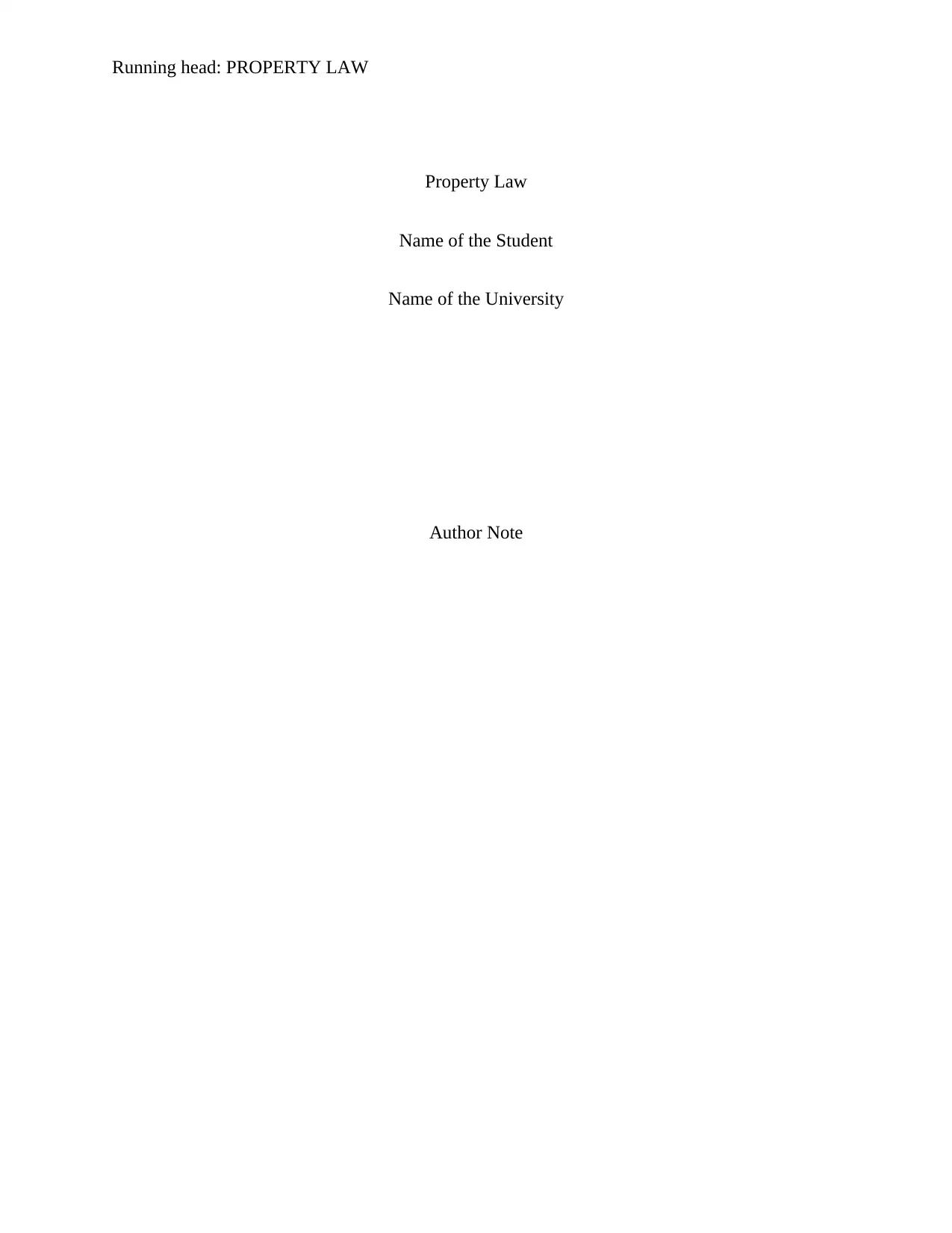
Running head: PROPERTY LAW
Property Law
Name of the Student
Name of the University
Author Note
Property Law
Name of the Student
Name of the University
Author Note
Paraphrase This Document
Need a fresh take? Get an instant paraphrase of this document with our AI Paraphraser
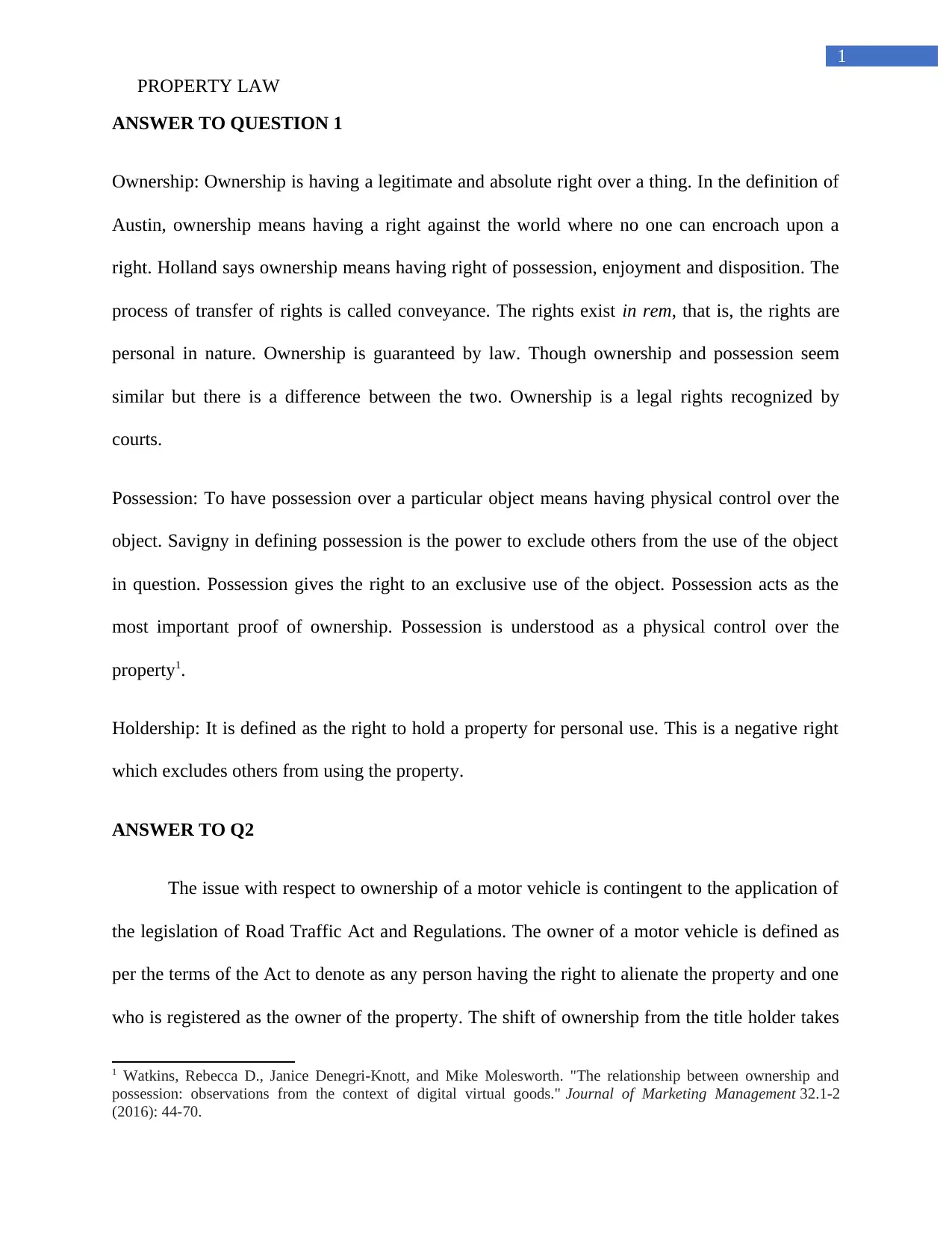
1
PROPERTY LAW
ANSWER TO QUESTION 1
Ownership: Ownership is having a legitimate and absolute right over a thing. In the definition of
Austin, ownership means having a right against the world where no one can encroach upon a
right. Holland says ownership means having right of possession, enjoyment and disposition. The
process of transfer of rights is called conveyance. The rights exist in rem, that is, the rights are
personal in nature. Ownership is guaranteed by law. Though ownership and possession seem
similar but there is a difference between the two. Ownership is a legal rights recognized by
courts.
Possession: To have possession over a particular object means having physical control over the
object. Savigny in defining possession is the power to exclude others from the use of the object
in question. Possession gives the right to an exclusive use of the object. Possession acts as the
most important proof of ownership. Possession is understood as a physical control over the
property1.
Holdership: It is defined as the right to hold a property for personal use. This is a negative right
which excludes others from using the property.
ANSWER TO Q2
The issue with respect to ownership of a motor vehicle is contingent to the application of
the legislation of Road Traffic Act and Regulations. The owner of a motor vehicle is defined as
per the terms of the Act to denote as any person having the right to alienate the property and one
who is registered as the owner of the property. The shift of ownership from the title holder takes
1 Watkins, Rebecca D., Janice Denegri-Knott, and Mike Molesworth. "The relationship between ownership and
possession: observations from the context of digital virtual goods." Journal of Marketing Management 32.1-2
(2016): 44-70.
PROPERTY LAW
ANSWER TO QUESTION 1
Ownership: Ownership is having a legitimate and absolute right over a thing. In the definition of
Austin, ownership means having a right against the world where no one can encroach upon a
right. Holland says ownership means having right of possession, enjoyment and disposition. The
process of transfer of rights is called conveyance. The rights exist in rem, that is, the rights are
personal in nature. Ownership is guaranteed by law. Though ownership and possession seem
similar but there is a difference between the two. Ownership is a legal rights recognized by
courts.
Possession: To have possession over a particular object means having physical control over the
object. Savigny in defining possession is the power to exclude others from the use of the object
in question. Possession gives the right to an exclusive use of the object. Possession acts as the
most important proof of ownership. Possession is understood as a physical control over the
property1.
Holdership: It is defined as the right to hold a property for personal use. This is a negative right
which excludes others from using the property.
ANSWER TO Q2
The issue with respect to ownership of a motor vehicle is contingent to the application of
the legislation of Road Traffic Act and Regulations. The owner of a motor vehicle is defined as
per the terms of the Act to denote as any person having the right to alienate the property and one
who is registered as the owner of the property. The shift of ownership from the title holder takes
1 Watkins, Rebecca D., Janice Denegri-Knott, and Mike Molesworth. "The relationship between ownership and
possession: observations from the context of digital virtual goods." Journal of Marketing Management 32.1-2
(2016): 44-70.
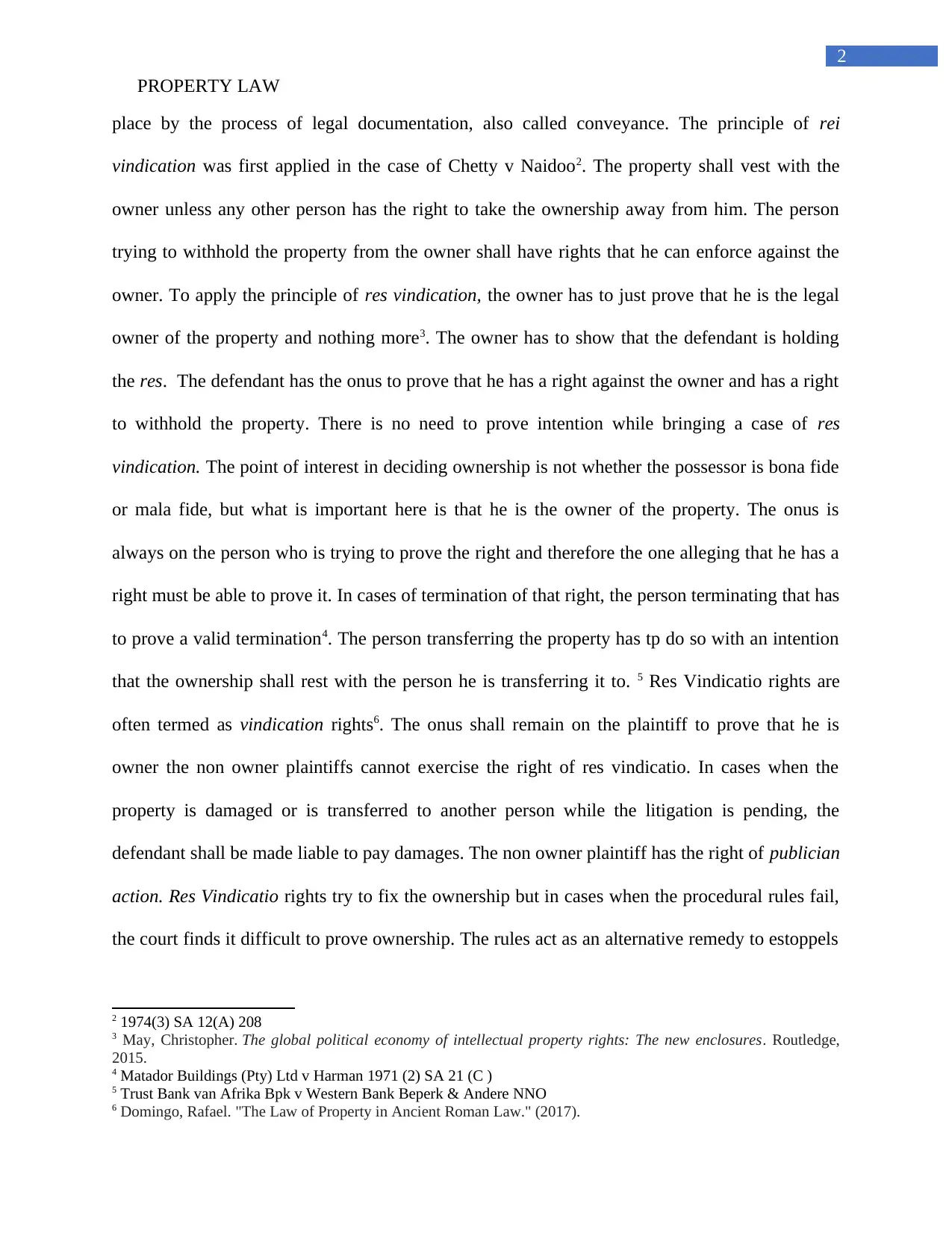
2
PROPERTY LAW
place by the process of legal documentation, also called conveyance. The principle of rei
vindication was first applied in the case of Chetty v Naidoo2. The property shall vest with the
owner unless any other person has the right to take the ownership away from him. The person
trying to withhold the property from the owner shall have rights that he can enforce against the
owner. To apply the principle of res vindication, the owner has to just prove that he is the legal
owner of the property and nothing more3. The owner has to show that the defendant is holding
the res. The defendant has the onus to prove that he has a right against the owner and has a right
to withhold the property. There is no need to prove intention while bringing a case of res
vindication. The point of interest in deciding ownership is not whether the possessor is bona fide
or mala fide, but what is important here is that he is the owner of the property. The onus is
always on the person who is trying to prove the right and therefore the one alleging that he has a
right must be able to prove it. In cases of termination of that right, the person terminating that has
to prove a valid termination4. The person transferring the property has tp do so with an intention
that the ownership shall rest with the person he is transferring it to. 5 Res Vindicatio rights are
often termed as vindication rights6. The onus shall remain on the plaintiff to prove that he is
owner the non owner plaintiffs cannot exercise the right of res vindicatio. In cases when the
property is damaged or is transferred to another person while the litigation is pending, the
defendant shall be made liable to pay damages. The non owner plaintiff has the right of publician
action. Res Vindicatio rights try to fix the ownership but in cases when the procedural rules fail,
the court finds it difficult to prove ownership. The rules act as an alternative remedy to estoppels
2 1974(3) SA 12(A) 208
3 May, Christopher. The global political economy of intellectual property rights: The new enclosures. Routledge,
2015.
4 Matador Buildings (Pty) Ltd v Harman 1971 (2) SA 21 (C )
5 Trust Bank van Afrika Bpk v Western Bank Beperk & Andere NNO
6 Domingo, Rafael. "The Law of Property in Ancient Roman Law." (2017).
PROPERTY LAW
place by the process of legal documentation, also called conveyance. The principle of rei
vindication was first applied in the case of Chetty v Naidoo2. The property shall vest with the
owner unless any other person has the right to take the ownership away from him. The person
trying to withhold the property from the owner shall have rights that he can enforce against the
owner. To apply the principle of res vindication, the owner has to just prove that he is the legal
owner of the property and nothing more3. The owner has to show that the defendant is holding
the res. The defendant has the onus to prove that he has a right against the owner and has a right
to withhold the property. There is no need to prove intention while bringing a case of res
vindication. The point of interest in deciding ownership is not whether the possessor is bona fide
or mala fide, but what is important here is that he is the owner of the property. The onus is
always on the person who is trying to prove the right and therefore the one alleging that he has a
right must be able to prove it. In cases of termination of that right, the person terminating that has
to prove a valid termination4. The person transferring the property has tp do so with an intention
that the ownership shall rest with the person he is transferring it to. 5 Res Vindicatio rights are
often termed as vindication rights6. The onus shall remain on the plaintiff to prove that he is
owner the non owner plaintiffs cannot exercise the right of res vindicatio. In cases when the
property is damaged or is transferred to another person while the litigation is pending, the
defendant shall be made liable to pay damages. The non owner plaintiff has the right of publician
action. Res Vindicatio rights try to fix the ownership but in cases when the procedural rules fail,
the court finds it difficult to prove ownership. The rules act as an alternative remedy to estoppels
2 1974(3) SA 12(A) 208
3 May, Christopher. The global political economy of intellectual property rights: The new enclosures. Routledge,
2015.
4 Matador Buildings (Pty) Ltd v Harman 1971 (2) SA 21 (C )
5 Trust Bank van Afrika Bpk v Western Bank Beperk & Andere NNO
6 Domingo, Rafael. "The Law of Property in Ancient Roman Law." (2017).
⊘ This is a preview!⊘
Do you want full access?
Subscribe today to unlock all pages.

Trusted by 1+ million students worldwide
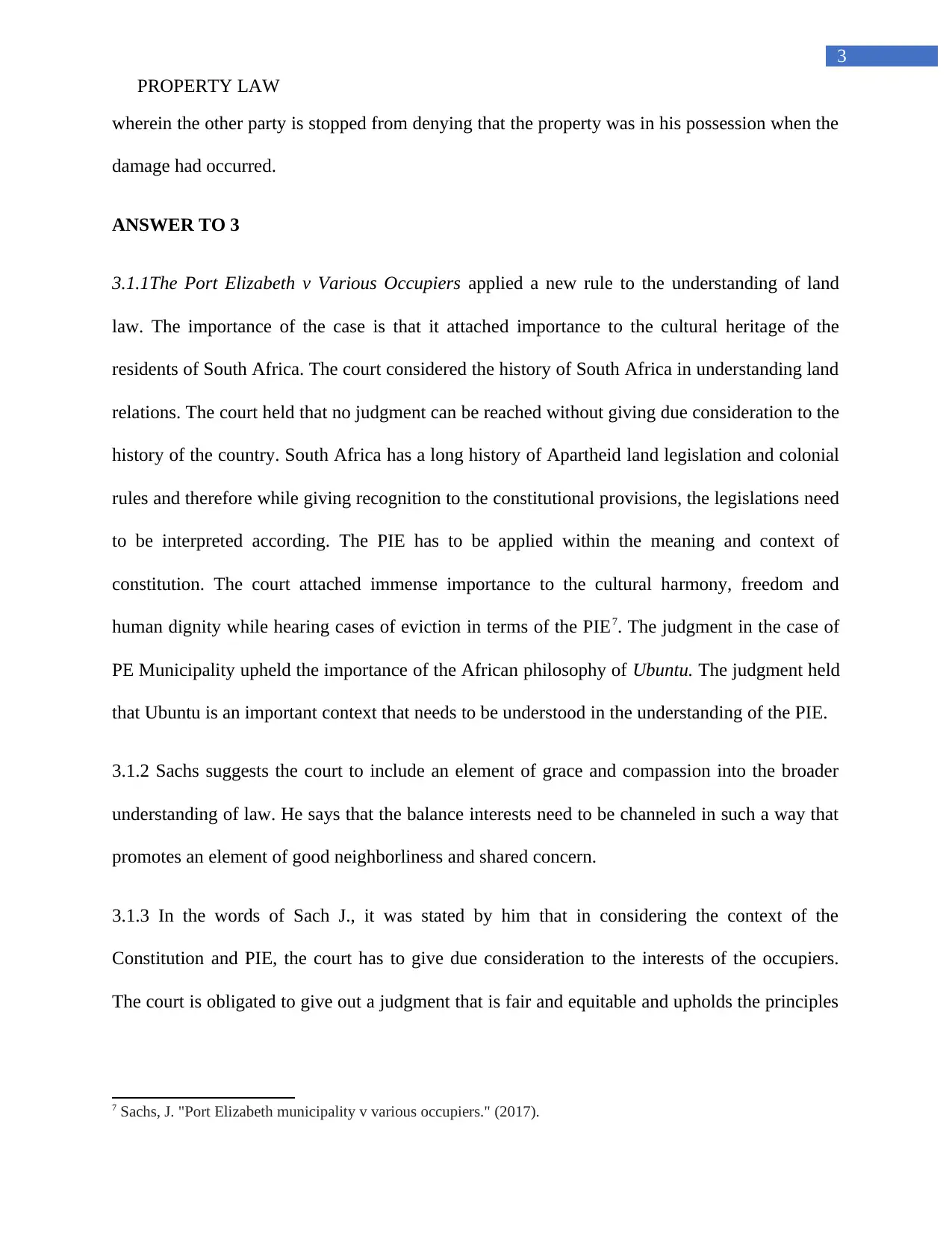
3
PROPERTY LAW
wherein the other party is stopped from denying that the property was in his possession when the
damage had occurred.
ANSWER TO 3
3.1.1The Port Elizabeth v Various Occupiers applied a new rule to the understanding of land
law. The importance of the case is that it attached importance to the cultural heritage of the
residents of South Africa. The court considered the history of South Africa in understanding land
relations. The court held that no judgment can be reached without giving due consideration to the
history of the country. South Africa has a long history of Apartheid land legislation and colonial
rules and therefore while giving recognition to the constitutional provisions, the legislations need
to be interpreted according. The PIE has to be applied within the meaning and context of
constitution. The court attached immense importance to the cultural harmony, freedom and
human dignity while hearing cases of eviction in terms of the PIE7. The judgment in the case of
PE Municipality upheld the importance of the African philosophy of Ubuntu. The judgment held
that Ubuntu is an important context that needs to be understood in the understanding of the PIE.
3.1.2 Sachs suggests the court to include an element of grace and compassion into the broader
understanding of law. He says that the balance interests need to be channeled in such a way that
promotes an element of good neighborliness and shared concern.
3.1.3 In the words of Sach J., it was stated by him that in considering the context of the
Constitution and PIE, the court has to give due consideration to the interests of the occupiers.
The court is obligated to give out a judgment that is fair and equitable and upholds the principles
7 Sachs, J. "Port Elizabeth municipality v various occupiers." (2017).
PROPERTY LAW
wherein the other party is stopped from denying that the property was in his possession when the
damage had occurred.
ANSWER TO 3
3.1.1The Port Elizabeth v Various Occupiers applied a new rule to the understanding of land
law. The importance of the case is that it attached importance to the cultural heritage of the
residents of South Africa. The court considered the history of South Africa in understanding land
relations. The court held that no judgment can be reached without giving due consideration to the
history of the country. South Africa has a long history of Apartheid land legislation and colonial
rules and therefore while giving recognition to the constitutional provisions, the legislations need
to be interpreted according. The PIE has to be applied within the meaning and context of
constitution. The court attached immense importance to the cultural harmony, freedom and
human dignity while hearing cases of eviction in terms of the PIE7. The judgment in the case of
PE Municipality upheld the importance of the African philosophy of Ubuntu. The judgment held
that Ubuntu is an important context that needs to be understood in the understanding of the PIE.
3.1.2 Sachs suggests the court to include an element of grace and compassion into the broader
understanding of law. He says that the balance interests need to be channeled in such a way that
promotes an element of good neighborliness and shared concern.
3.1.3 In the words of Sach J., it was stated by him that in considering the context of the
Constitution and PIE, the court has to give due consideration to the interests of the occupiers.
The court is obligated to give out a judgment that is fair and equitable and upholds the principles
7 Sachs, J. "Port Elizabeth municipality v various occupiers." (2017).
Paraphrase This Document
Need a fresh take? Get an instant paraphrase of this document with our AI Paraphraser
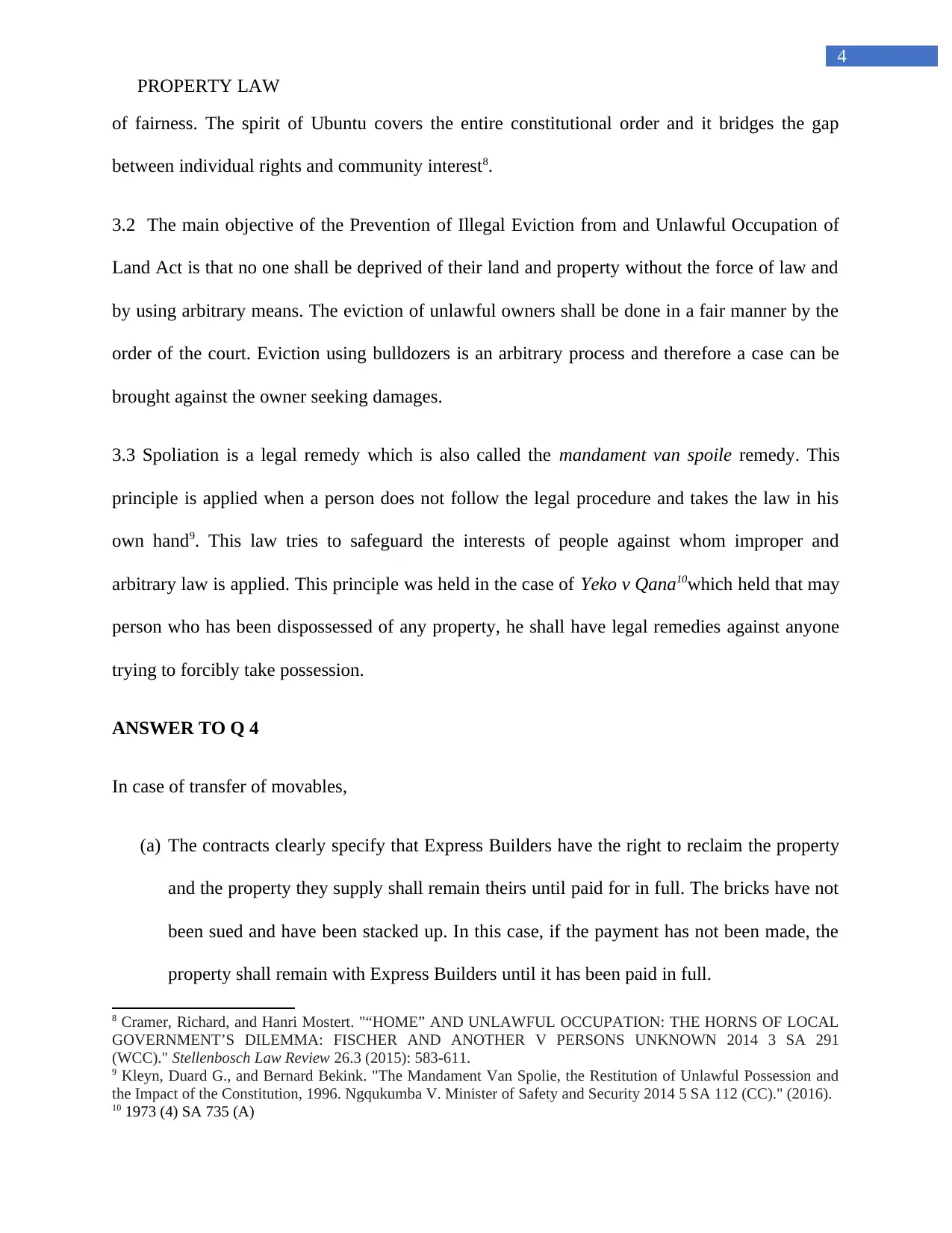
4
PROPERTY LAW
of fairness. The spirit of Ubuntu covers the entire constitutional order and it bridges the gap
between individual rights and community interest8.
3.2 The main objective of the Prevention of Illegal Eviction from and Unlawful Occupation of
Land Act is that no one shall be deprived of their land and property without the force of law and
by using arbitrary means. The eviction of unlawful owners shall be done in a fair manner by the
order of the court. Eviction using bulldozers is an arbitrary process and therefore a case can be
brought against the owner seeking damages.
3.3 Spoliation is a legal remedy which is also called the mandament van spoile remedy. This
principle is applied when a person does not follow the legal procedure and takes the law in his
own hand9. This law tries to safeguard the interests of people against whom improper and
arbitrary law is applied. This principle was held in the case of Yeko v Qana10which held that may
person who has been dispossessed of any property, he shall have legal remedies against anyone
trying to forcibly take possession.
ANSWER TO Q 4
In case of transfer of movables,
(a) The contracts clearly specify that Express Builders have the right to reclaim the property
and the property they supply shall remain theirs until paid for in full. The bricks have not
been sued and have been stacked up. In this case, if the payment has not been made, the
property shall remain with Express Builders until it has been paid in full.
8 Cramer, Richard, and Hanri Mostert. "“HOME” AND UNLAWFUL OCCUPATION: THE HORNS OF LOCAL
GOVERNMENT’S DILEMMA: FISCHER AND ANOTHER V PERSONS UNKNOWN 2014 3 SA 291
(WCC)." Stellenbosch Law Review 26.3 (2015): 583-611.
9 Kleyn, Duard G., and Bernard Bekink. "The Mandament Van Spolie, the Restitution of Unlawful Possession and
the Impact of the Constitution, 1996. Ngqukumba V. Minister of Safety and Security 2014 5 SA 112 (CC)." (2016).
10 1973 (4) SA 735 (A)
PROPERTY LAW
of fairness. The spirit of Ubuntu covers the entire constitutional order and it bridges the gap
between individual rights and community interest8.
3.2 The main objective of the Prevention of Illegal Eviction from and Unlawful Occupation of
Land Act is that no one shall be deprived of their land and property without the force of law and
by using arbitrary means. The eviction of unlawful owners shall be done in a fair manner by the
order of the court. Eviction using bulldozers is an arbitrary process and therefore a case can be
brought against the owner seeking damages.
3.3 Spoliation is a legal remedy which is also called the mandament van spoile remedy. This
principle is applied when a person does not follow the legal procedure and takes the law in his
own hand9. This law tries to safeguard the interests of people against whom improper and
arbitrary law is applied. This principle was held in the case of Yeko v Qana10which held that may
person who has been dispossessed of any property, he shall have legal remedies against anyone
trying to forcibly take possession.
ANSWER TO Q 4
In case of transfer of movables,
(a) The contracts clearly specify that Express Builders have the right to reclaim the property
and the property they supply shall remain theirs until paid for in full. The bricks have not
been sued and have been stacked up. In this case, if the payment has not been made, the
property shall remain with Express Builders until it has been paid in full.
8 Cramer, Richard, and Hanri Mostert. "“HOME” AND UNLAWFUL OCCUPATION: THE HORNS OF LOCAL
GOVERNMENT’S DILEMMA: FISCHER AND ANOTHER V PERSONS UNKNOWN 2014 3 SA 291
(WCC)." Stellenbosch Law Review 26.3 (2015): 583-611.
9 Kleyn, Duard G., and Bernard Bekink. "The Mandament Van Spolie, the Restitution of Unlawful Possession and
the Impact of the Constitution, 1996. Ngqukumba V. Minister of Safety and Security 2014 5 SA 112 (CC)." (2016).
10 1973 (4) SA 735 (A)
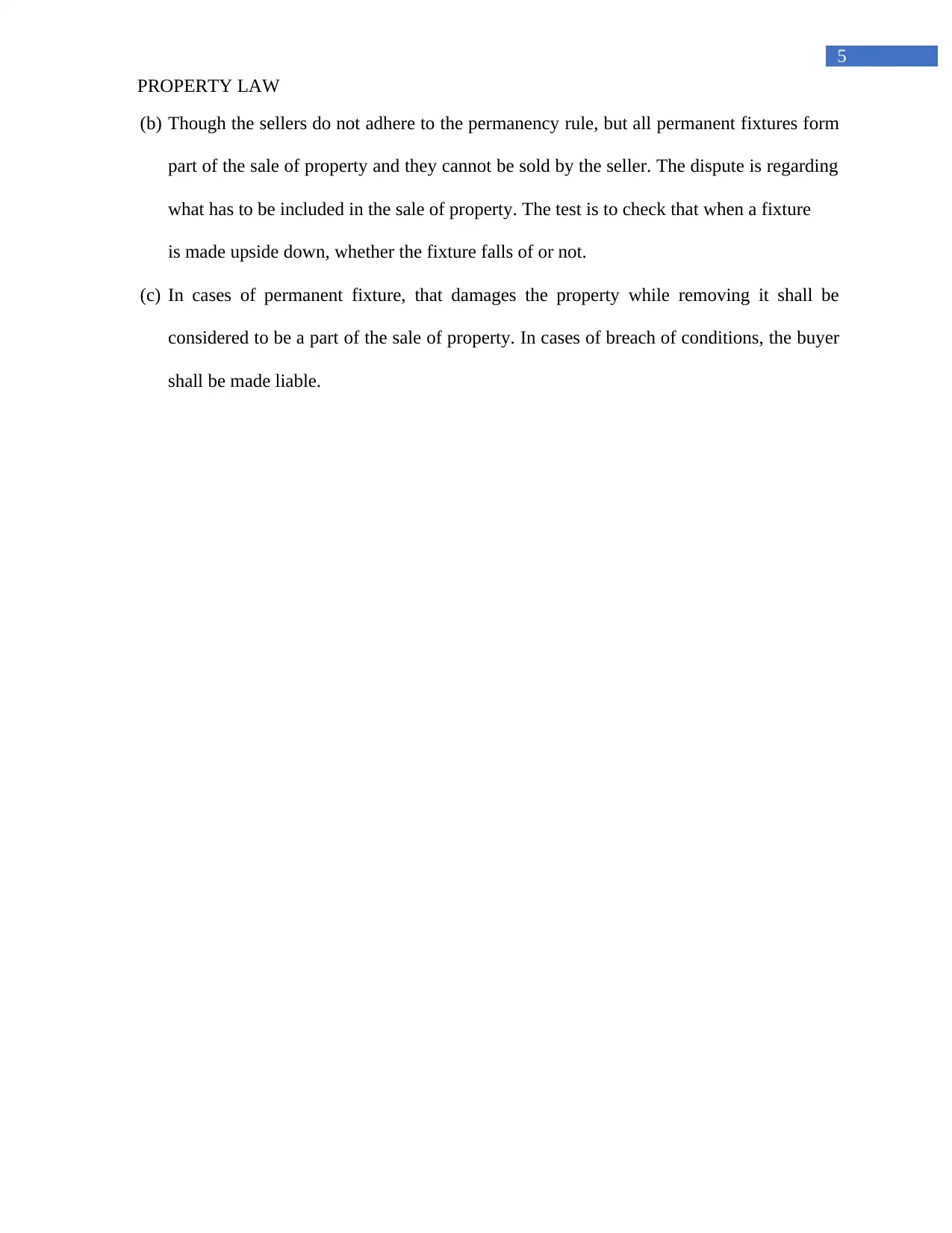
5
PROPERTY LAW
(b) Though the sellers do not adhere to the permanency rule, but all permanent fixtures form
part of the sale of property and they cannot be sold by the seller. The dispute is regarding
what has to be included in the sale of property. The test is to check that when a fixture
is made upside down, whether the fixture falls of or not.
(c) In cases of permanent fixture, that damages the property while removing it shall be
considered to be a part of the sale of property. In cases of breach of conditions, the buyer
shall be made liable.
PROPERTY LAW
(b) Though the sellers do not adhere to the permanency rule, but all permanent fixtures form
part of the sale of property and they cannot be sold by the seller. The dispute is regarding
what has to be included in the sale of property. The test is to check that when a fixture
is made upside down, whether the fixture falls of or not.
(c) In cases of permanent fixture, that damages the property while removing it shall be
considered to be a part of the sale of property. In cases of breach of conditions, the buyer
shall be made liable.
⊘ This is a preview!⊘
Do you want full access?
Subscribe today to unlock all pages.

Trusted by 1+ million students worldwide
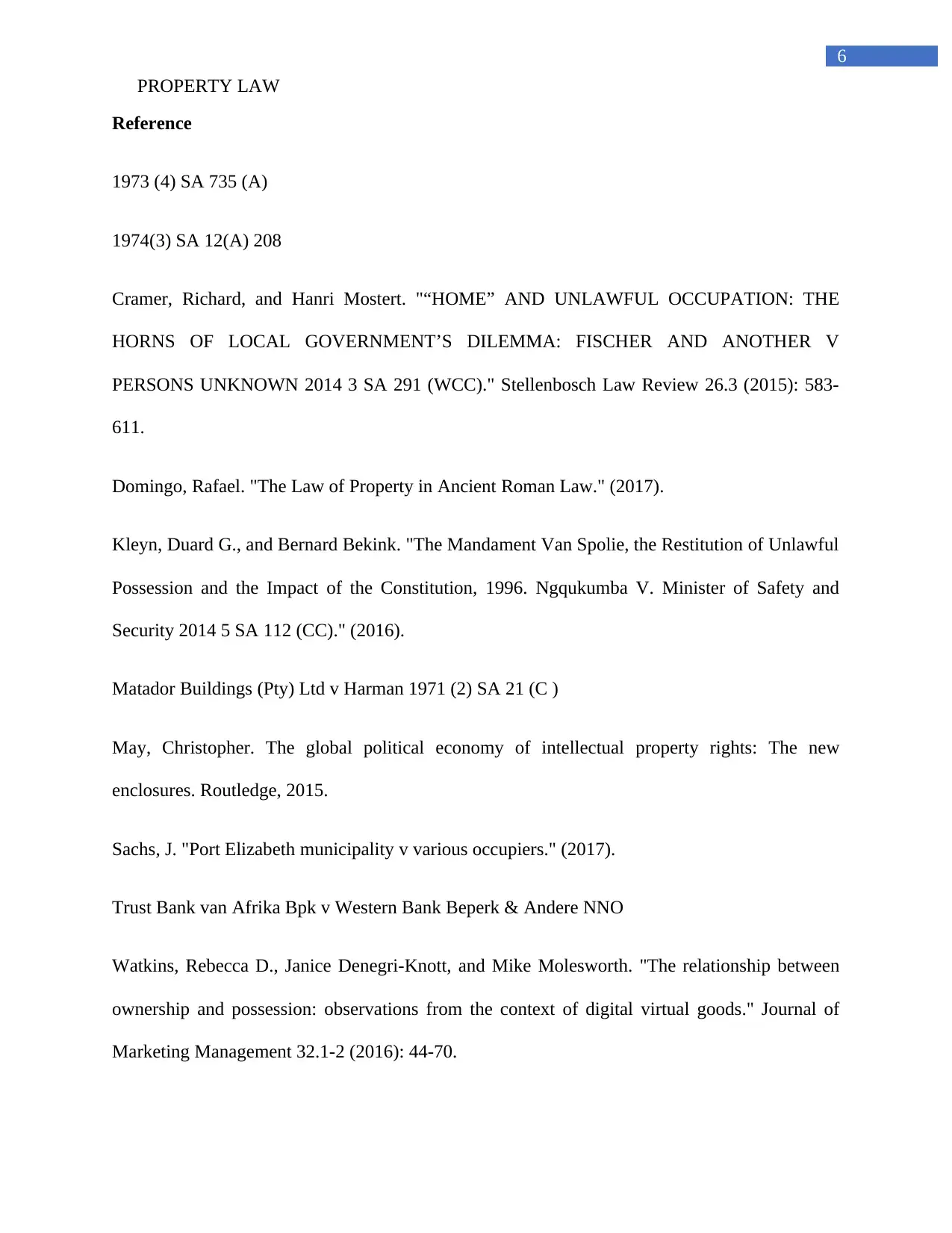
6
PROPERTY LAW
Reference
1973 (4) SA 735 (A)
1974(3) SA 12(A) 208
Cramer, Richard, and Hanri Mostert. "“HOME” AND UNLAWFUL OCCUPATION: THE
HORNS OF LOCAL GOVERNMENT’S DILEMMA: FISCHER AND ANOTHER V
PERSONS UNKNOWN 2014 3 SA 291 (WCC)." Stellenbosch Law Review 26.3 (2015): 583-
611.
Domingo, Rafael. "The Law of Property in Ancient Roman Law." (2017).
Kleyn, Duard G., and Bernard Bekink. "The Mandament Van Spolie, the Restitution of Unlawful
Possession and the Impact of the Constitution, 1996. Ngqukumba V. Minister of Safety and
Security 2014 5 SA 112 (CC)." (2016).
Matador Buildings (Pty) Ltd v Harman 1971 (2) SA 21 (C )
May, Christopher. The global political economy of intellectual property rights: The new
enclosures. Routledge, 2015.
Sachs, J. "Port Elizabeth municipality v various occupiers." (2017).
Trust Bank van Afrika Bpk v Western Bank Beperk & Andere NNO
Watkins, Rebecca D., Janice Denegri-Knott, and Mike Molesworth. "The relationship between
ownership and possession: observations from the context of digital virtual goods." Journal of
Marketing Management 32.1-2 (2016): 44-70.
PROPERTY LAW
Reference
1973 (4) SA 735 (A)
1974(3) SA 12(A) 208
Cramer, Richard, and Hanri Mostert. "“HOME” AND UNLAWFUL OCCUPATION: THE
HORNS OF LOCAL GOVERNMENT’S DILEMMA: FISCHER AND ANOTHER V
PERSONS UNKNOWN 2014 3 SA 291 (WCC)." Stellenbosch Law Review 26.3 (2015): 583-
611.
Domingo, Rafael. "The Law of Property in Ancient Roman Law." (2017).
Kleyn, Duard G., and Bernard Bekink. "The Mandament Van Spolie, the Restitution of Unlawful
Possession and the Impact of the Constitution, 1996. Ngqukumba V. Minister of Safety and
Security 2014 5 SA 112 (CC)." (2016).
Matador Buildings (Pty) Ltd v Harman 1971 (2) SA 21 (C )
May, Christopher. The global political economy of intellectual property rights: The new
enclosures. Routledge, 2015.
Sachs, J. "Port Elizabeth municipality v various occupiers." (2017).
Trust Bank van Afrika Bpk v Western Bank Beperk & Andere NNO
Watkins, Rebecca D., Janice Denegri-Knott, and Mike Molesworth. "The relationship between
ownership and possession: observations from the context of digital virtual goods." Journal of
Marketing Management 32.1-2 (2016): 44-70.
Paraphrase This Document
Need a fresh take? Get an instant paraphrase of this document with our AI Paraphraser

7
PROPERTY LAW
PROPERTY LAW
1 out of 8
Related Documents
Your All-in-One AI-Powered Toolkit for Academic Success.
+13062052269
info@desklib.com
Available 24*7 on WhatsApp / Email
![[object Object]](/_next/static/media/star-bottom.7253800d.svg)
Unlock your academic potential
Copyright © 2020–2025 A2Z Services. All Rights Reserved. Developed and managed by ZUCOL.




